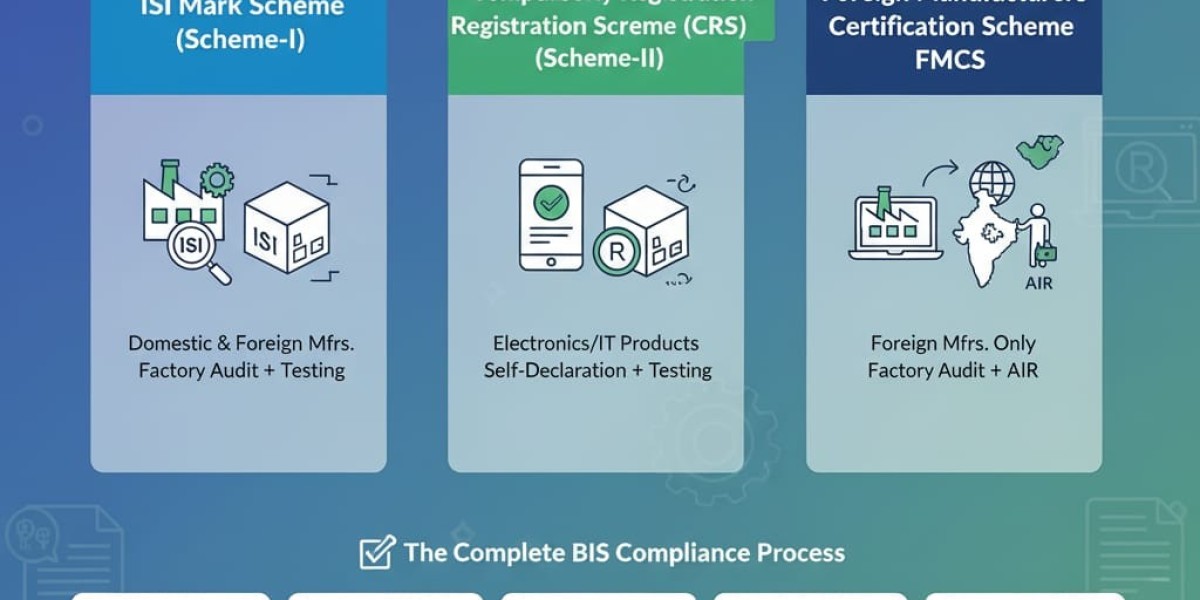Introduction
In today’s highly regulated market, product quality and safety are no longer optional — they are essential. For manufacturers and importers who want to sell their products in the Indian market, obtaining a BIS Licence or completing BIS Registration is a mandatory compliance requirement for many product categories. These certifications ensure that products meet the safety, quality, and performance standards laid down by the Bureau of Indian Standards (BIS). This blog will give you a complete understanding of the BIS Licence and BIS Registration process, their differences, requirements, benefits, and why they are critical for your business success in India.
What is a BIS Licence?
A BIS Licence is granted under the ISI Mark Scheme managed by the Bureau of Indian Standards. This licence allows manufacturers to use the ISI Mark on their products, confirming that the product conforms to Indian Standard specifications.
This licence is mandatory for many products, such as:
Electrical appliances
Cement and steel products
Household items
Pressure cookers
Industrial materials
Automotive components
Without a BIS Licence, selling or manufacturing such products in India is illegal.
What is BIS Registration?
BIS Registration is issued under the Compulsory Registration Scheme (CRS). It applies mainly to electronic and IT products that fall under the Ministry of Electronics and Information Technology (MeitY) regulations.
Products requiring BIS Registration include:
Mobile phones
Power adapters
LED lights
Laptops and tablets
Smart watches
Set-top boxes
USB power banks
Under this scheme, manufacturers must register their products with BIS after testing them in a BIS-recognized laboratory.
Key Differences Between BIS Licence and BIS Registration
Feature | BIS Licence | BIS Registration |
Scheme | ISI Mark Scheme | Compulsory Registration Scheme (CRS) |
Applicable To | Manufacturers of regulated products | Electronic and IT product manufacturers |
Product Testing | Mandatory before licence | Mandatory before registration |
Factory Inspection | Yes | No (mostly document-based) |
Mark Used | ISI Mark | Standard BIS CRS Mark |
Both BIS Licence and BIS Registration aim to ensure quality compliance, but their procedures and product scopes differ.
Why Do You Need a BIS Licence and BIS Registration?
Having proper BIS certification offers several important advantages:
Legal Compliance
Many products cannot be sold in the Indian market without a BIS Licence or BIS Registration. Non-compliance can result in penalties, bans, or product seizures.Customer Trust
The ISI mark and BIS registration mark act as symbols of trust, assuring customers that your product meets national quality and safety standards.Market Expansion
Certified products get easier entry into retail chains, e-commerce platforms, and government tenders.Improved Product Quality
The certification process involves product testing and factory checks that help improve manufacturing standards.
BIS Licence Process Step-by-Step
Here’s how the BIS Licence process generally works:
Application Submission
The manufacturer submits an online application with all required details and documents to BIS.Product Testing
Samples are sent to a BIS-recognized laboratory for testing as per the relevant Indian Standard.Factory Inspection
After successful testing, BIS officers conduct a factory inspection to verify manufacturing capabilities and quality control systems.Grant of Licence
If everything complies, the BIS Licence is issued along with a unique licence number that allows the use of the ISI mark.
BIS Registration Process Step-by-Step
The BIS Registration process for electronics and IT products includes:
Product Testing
The product sample is tested in a BIS-approved lab.Online Application Filing
The manufacturer submits the test report and required details on the BIS portal.Document Verification
BIS verifies the documents and test results.Grant of Registration
Once approved, BIS issues the registration certificate along with a registration number for product labeling.
Documents Required for BIS Licence and BIS Registration
Here are the common documents required for both:
Manufacturing unit registration certificate
Business registration proof
Factory layout and location map
List of machinery and testing equipment
Quality control details
Product test reports (from BIS-approved labs)
Authorized signatory details
Brand authorization letter (if applicable)
Accurate documentation and proper testing are crucial for quick approval.
Common Challenges in BIS Certification
Many applicants face challenges such as:
Incorrect documentation
Delays in lab testing
Non-compliance during factory inspections
Confusion over applicable standards
Lack of technical knowledge
Professional guidance helps reduce these issues and ensures a smoother certification journey.
Validity and Renewal
Both BIS Licence and BIS Registration are issued for a limited period and must be renewed before expiry.
BIS Licence: Usually valid for 1–2 years
BIS Registration: Typically valid for 2 years
Renewal requires updated documentation, test reports, and compliance verification.
Tips for Successful BIS Certification
Understand the correct product category and standard
Choose a BIS-recognized testing laboratory
Maintain proper test and quality control records
Ensure factory readiness before inspection
Keep documents clear and updated
These steps improve approval speed and reduce rejection risks.
Conclusion
Whether you are a domestic manufacturer or a foreign brand entering the Indian market, obtaining a sunconsultants.co.in or completing BIS Registration is a critical step. It not only ensures legal compliance but also strengthens your brand’s credibility and product quality.








